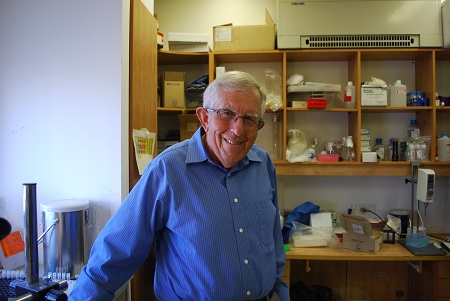
The International Society for Affective Disorders (ISAD) has honored the Hadassah Medical Center’s pioneering psychiatrist Prof. Bernard Lerer with its first-ever Lifetime Achievement Award.
Prof. Lerer, 71, was born in South Africa and moved to Israel as a young physician. He entered the field of psychiatry just after the revolutionary anti-psychotic and anti-depressant drugs like lithium, chlorpromazine, and imipramine were introduced.
“Before the advent of these drugs, people would be incarcerated in institutions or commit suicide if they were severely depressed,” says Prof. Lerer. “You could put psychotic patients to sleep for days on end, but the minute they woke up, they were still psychotic.”
Since then, Prof. Lerer has helped lead the turnaround in psychiatry.
In 1990, Prof. Lerer set up the Biological Psychiatry Laboratory at the Hadassah Medical Center, which he still heads 30 years later.
“We focus on developing medicines that can be useful for treating depression and, to some extent, on brain stimulation,” says Prof. Lerer.
A particular area of interest is the impact of the thyroid gland on depression.
Prof. Lerer’s team believes thyroid hormones help relieve depression as an adjunct to anti-depressants. Together with a chemist in India, Prof. Lerer synthesized a new series of compounds that have been patented by Hadassah’s technology transfer company, Hadasit.
“Over the years I’ve embraced whatever tools could bring me to understand the biology of psychiatry, such as brain imaging, biochemistry, and genetics,” says Prof. Lerer. “If you can find the genes that are associated with a disorder, then you can understand the biology.”
Prof. Lerer is one of the Hadassah physicians/scientists using the facilities of the recently opened Wohl Institute for Translational Medicine to foster translational medicine, speeding the process from laboratory to patient care. Prof. Lerer also established (with Prof. Hanna Rosenman of the Neurology Department) a National Knowledge Center, backed by the Israeli Science Ministry, to provide drug-testing services to researchers at Israeli universities and to biotechnology companies. His list of credits includes being the founding Editor-in-Chief of the International Journal of Neuropsychopharmacology and Vice President of The International College of Neuropsychopharmacology.
“Thanks to the advances in psychiatry over the last seven decades, most patients don’t need to be hospitalized,” relates Prof. Lerer. He adds, however, “We still have a long way to go. For example, antipsychotic medications are effective, but the disease itself is chronic and impacts the sufferers’ lives. But one enormous positive change is that the stigma associated with mental illness has vastly decreased. No one should hesitate today to seek treatment. These are diseases like all others, and there have been so many advances.”
Prof. Lerer lives with his wife, Ziona, in Alon Shvut, south of Jerusalem. He is the father of three and the grandfather of seven. A former rugby player, he’s still a fit cyclist and long-distance runner.
